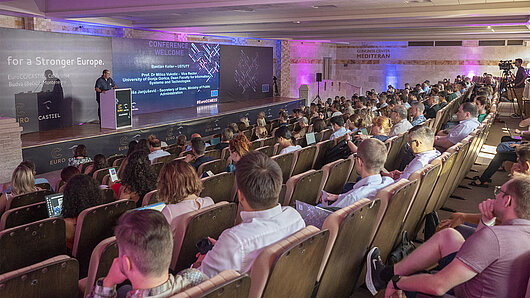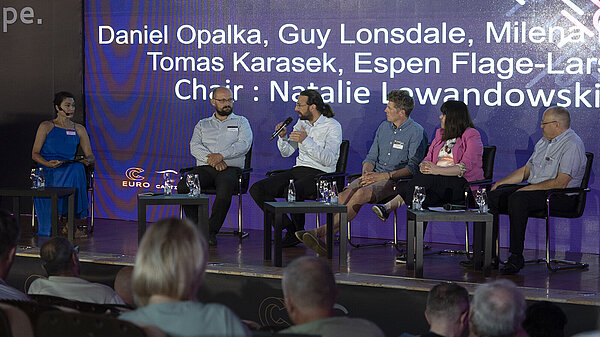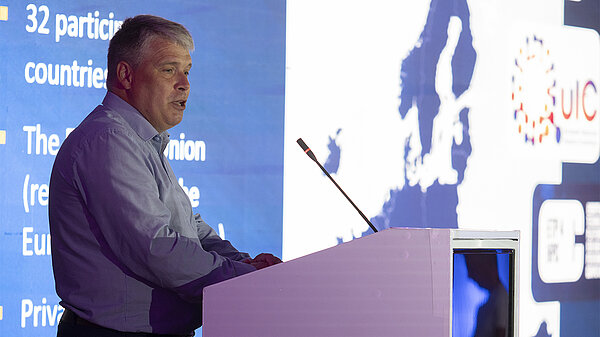High-Performance Computing Center Stuttgart

According to Dr. Bastian Koller, Managing Director at the High-Performance Computing Center Stuttgart (HLRS), “There’s a massive amount of money currently invested in hardware (and) this is a very important pillar to be able to run simulations, data analytics, and AI. These resources cannot just benefit a small number of people—we have to ensure that we utilize these possibilities maximally.”
Koller’s remarks came in his introductory presentation at the first all-hands meeting of EuroCC and CASTIEL, two interrelated projects funded by the EuroHPC Joint Undertaking (JU) whose goal is to increase HPC expertise and usage across the entire European Union. Koller serves as Project Coordinator of EuroCC and CASTIEL, and the two projects are managed by HLRS.
Held at the University of Donja Gorica in Bečići, Montenegro under the motto “Uniting Competencies for a Stronger Europe,” the conference brought together representatives of 32 of the 33 nations that have banded together within EuroCC. This first face-to-face meeting of the entire EuroCC community offered an opportunity to reflect on the successes of the projects thus far, to share insights and best practices, to start new collaborations, and to plan for the second phase of the projects, which will begin next year.
EuroCC and CASTIEL are complementary projects created to maximize the impact of high-performance computing, high-performance data analytics (HPDA), and artificial intelligence (AI) across Europe. Achieving this goal means identifying potential user communities, helping them to recognize the opportunities HPC and related technologies could offer, and providing the training they need to use them effectively. For a variety of reasons, countries across Europe have different levels of experience in the competencies necessary for this complex undertaking. By building an international community focused on collaboration and information sharing, EuroCC and CASTIEL aim to change this.

Launched in 2020, EuroCC first helped to establish national competence centers (NCCs) for HPC, HPDA, and AI in 33 European countries. Each NCC subsequently completed a national HPC competency audit that documents available expertise and resources, as well as knowledge gaps. The NCCs are also central contact points for the HPC communities in their home countries.
In parallel, CASTIEL has been leading activities to promote interactions and knowledge sharing across borders. At the conference Koller reported that despite the COVID-19 pandemic, the NCCs have thus far held 60 workshops and 95 training courses focusing on key skills and knowledge for HPC system users.
The EuroCC conference in Montenegro also promises to have aftereffects that increase international cooperation. In a post-conference survey of attendees, 79% reported that they are now planning new collaborations with other NCCs, and 67% began planning new twinning activities, mentoring, or workshops during the conference.
CASTIEL has also been building a European HPC competence map, which provides reliable information about how to access more than 150 competencies across the EuroCC participating states. The information is freely available on the EuroCC Access website as a resource for anyone in Europe with questions about HPC and related technologies.
EuroCC and CASTIEL are two of several projects being supported by the EuroHPC Joint Undertaking (JU). In a keynote address, JU Executive Director Anders Dam Jensen discussed the role of EuroCC and CASTIEL in the context of Europe’s HPC strategy. “The NCCs are one of our most important projects,” Jensen remarked, suggesting that increasing understanding of high-performance computing will increase European technological independence and lead to new applications with EU-wide benefits.
In a panel focusing on the vision of the National Competence Centers, Daniel Opalka, who leads the EuroHPC Joint Undertaking’s Research and Innovation Sector, also commented on the unique role of EuroCC in within the overall JU strategy. “The network of national competence centers is … not only one of the largest projects, it’s also one of the most comprehensive and inclusive European projects that the JU currently manages,” he said. “We reach with the national competence centers an unprecedented number of communities to support the adoption of HPC, in particular in SMEs that are notoriously difficult to approach.”

Opalka indicated that the NCCs are also well situated to help guide the future European HPC strategy, adding, “For us as a funding authority it is very important for us through the activities of competence mapping, of monitoring the ecosystem, to understand how we can better support key stakeholders and communities.”
As the NCCs become more established, they will also become key nodes for interactions with other JU projects, including Centres of Excellence that are developing advanced software applications for large-scale computing systems, and European Digital Innovation Hubs, which support companies in developing new digital technologies.
Throughout the conference, discussion returned repeatedly to the question of what the NCCs can do to promote usage of HPC in new communities. As several speakers explained, this will require that the NCCs conduct outreach, learn to communicate effectively with industry, present relevant success stories that demonstrate the potential value of HPC, and provide the training and user support they will need to use HPC effectively.
To identify representative success stories, the network of national competence centers has supported two open calls organized by a third project called FF4EuroHPC. A sequel of sorts to the successful Fortissimo projects, this HLRS-led project provides seed funding for SMEs to conduct experiments testing a business application of HPC, data analytics, or AI.
As Claudio Arlandini of the Italian NCC based at CINECA explained, the NCCs can help small companies to conceive and design more effective project proposals. He is also a member of the FF4EuroHPC consortium and reported that of the 27 FF4EuroHPC applications in which CINECA played a supporting role, nearly half were awarded funding. “Even if an application is not successful for funding, from the point of view of the company it’s always a success,” Arlandini added. “It helps them to understand what HPC, HPDA, and AI can do, so they can start thinking about new lines of business. In many cases they become our customers or contact us about new funding opportunities.”
Speakers at the conference highlighted a variety of success stories in which the NCCs helped small companies to identify new applications of high-performance computing. These included tools for automated monitoring of livestock health, spotting and cleaning up litter in the ocean, and load forecasting for international energy market exchanges, among others.
For Guy Lonsdale of scapos AG, a veteran of European projects, the success stories that national competence centers have begun collecting will be valuable in getting new companies to try HPC. “The role of the NCCs is a regional one but the important thing is that they are interlinked to the other parts of the ecosystem,” he explained. Regardless of where they are produced, relevant success stories shared across the EuroCC network could offer model examples that enable NCCs to argue, “You could do this, too!”
The first round of funding for EuroCC and CASTIEL is due to expire at the end of 2022, but funding for the projects’ renewal has been approved and they will continue to grow in reach in the coming years. As Arlandini pointed out at the conclusion of his talk, such a long-term approach will be needed to have the greatest impact. “As an NCC we are not running a 100- meter run, we are running a marathon,” he said. “We have to focus on building the HPC user of the future.”
— Christopher Williams
The EuroCC Access Portal contains information about the 33 National Competence Centers and a European map of competences:
Watch video of the EuroCC / CASTIEL conference: Agenda, Day 1, Day 2